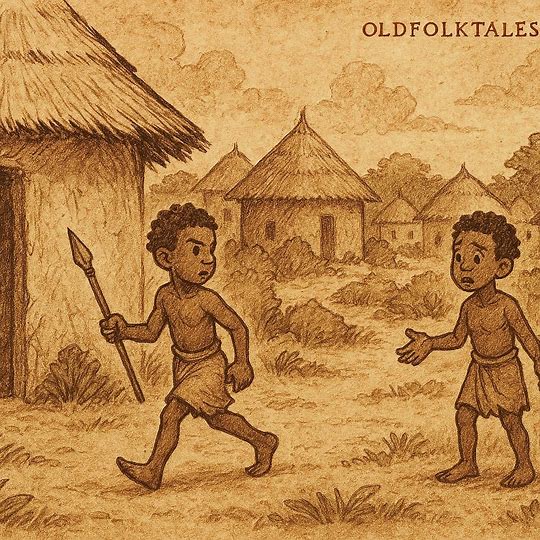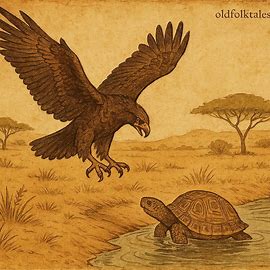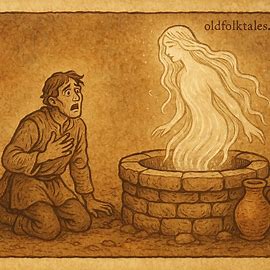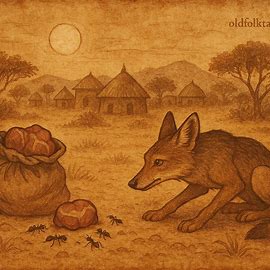In the heart of a Mossi village in Burkina Faso, a woman gave birth to twins, naming them Poko and Raogo. From the start, destiny was cruel: the mother took Poko home, nurturing him with love and care, but abandoned Raogo in the vast bush, leaving him alone under the sun and wind. The cries of the helpless baby echoed through the trees until a hawk, soaring high above, noticed the tiny figure and took pity. Gently, the hawk carried Raogo to its nest, feeding and protecting him as he grew strong.
Raogo’s first act of independence, once he could move and think for himself, was to kill the hawk that had raised him, an act of vengeance and determination. Soon after, he resolved to confront his parents, his mind burning with questions of abandonment and justice. As he journeyed toward the village, he sang a haunting song that traveled across the hills and fields:
“My mother gave birth to both of me,
She took Poko and abandoned Raogo.
I was left alone in the bush,
Now I shall find my fate!”
The song was a warning and a declaration, alerting everyone who heard it to the approach of a child wronged yet strong. Villagers paused in their daily work, sensing the weight in his words. He sang of his plan, of the mother who abandoned him and the father who did nothing, and of the reckoning he intended. His voice carried like the wind over the plains, steady and resolute, until he reached the outskirts of the village, approaching the familiar compounds of his childhood.
Raogo first approached Poko, who had grown up in safety and comfort. Poko, unaware of his brother’s suffering, greeted him as family should. Raogo’s voice, sharp and unwavering, cut through the warm afternoon air:
“Poko, where is our father?”
“Our father is in the granary,” Poko replied, puzzled by the tone and intensity of his brother’s question.
“And our mother?” Raogo pressed.
“She went to the pond,” said Poko, still confused by the determination he saw in Raogo’s eyes.
READ THIS: The Orphan Girl: A Mossi Folktale That Teaches Lessons on Humility and Kindness
Raogo paused, thinking of the peanuts their parents had once grown. He entered the mother’s hut to search. His heart, heavy with years of neglect and sorrow, did not waver. Inside the first earthenware pot, hidden as though afraid of life itself, he found his mother. With a single, swift blow, he ended her life, an act both horrifying and fated by the injustice of abandonment.
He left the hut and turned to Poko once more.
“Is there anything in the granary?” he asked.
“No, it is empty,” replied Poko, sensing the tension that had built like thunderclouds in the sky.
Raogo made his way to the granary. There, crouched among the stored grain, was his father. Without hesitation, Raogo struck, delivering the blow that he believed justice demanded. The act was swift, decisive, and final.
In this village, the tale of Poko and Raogo spread quickly, whispered by those who had heard the song of the boy left in the bush. Some spoke in awe of his courage, others in fear of the consequences of abandoning one’s child. The song, sung in sorrow and rage, remained in the memory of the land: a warning that justice, when delayed or ignored, will find its way through fate itself.
The story of the twins reminds the people that actions have consequences, that injustice toward the most vulnerable cannot remain unchecked. Raogo, raised by a hawk and abandoned by parents, exacted a harsh justice that was both feared and respected. Poko, safe and protected, witnessed the unfolding of fate’s balance. The villagers learned to honor life, care for children equally, and remember that every act, kind or cruel, shapes destiny.
Moral Lesson
This tale teaches that justice and fate are inevitable. Abandonment and cruelty, especially toward the innocent, bring consequences that cannot be ignored. It warns that neglecting one’s responsibilities, particularly toward children, can lead to irreversible tragedy. The story also highlights resilience: even those who grow in hardship, like Raogo, have agency and the power to confront injustice.
Knowledge Check
Who are the main characters in the story?
Poko and Raogo, twin brothers, along with their mother and father.
Why was Raogo abandoned in the bush?
The mother took Poko home and left Raogo alone, reflecting favoritism and neglect.
Who raised Raogo in the bush, and how?
A hawk found him and took care of him in its nest until he was strong.
What acts does Raogo commit when he returns to the village?
He kills the mother and father as acts of justice for their abandonment.
What lesson does the tale teach about fate and justice?
Neglecting responsibilities and cruelty toward the vulnerable leads to inevitable consequences.
Where does this folktale originate?
Mossi people, Burkina Faso.
Source: Mossi folktale, Burkina Faso






